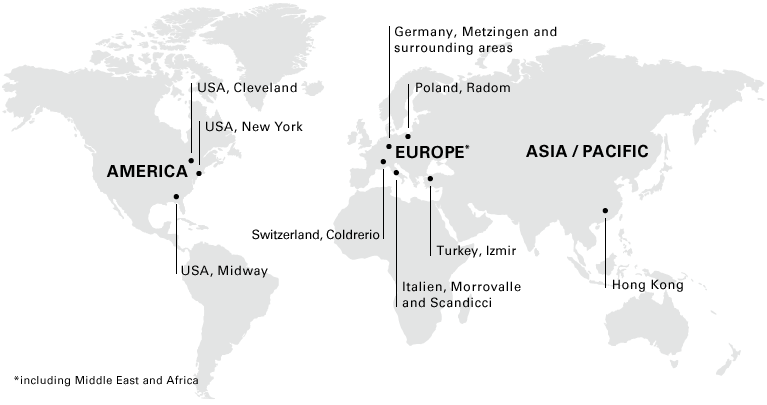Legal structure of the Group reflects dual management and control structure
The HUGO BOSS Group is managed by the parent company HUGO BOSS AG, based in Metzingen, Germany, where all of the Group management functions are bundled. As a German stock corporation, HUGO BOSS AG has a dual management and control structure. The Managing Board is responsible for the Group’s strategy and its management. The Supervisory Board advises the Managing Board and oversees its management activities. Apart from HUGO BOSS AG, the Group comprises 55 consolidated subsidiaries that are responsible for local business activities. Of these, 35 are organized as distribution companies. With few exceptions, HUGO BOSS AG has complete control over all subsidiaries. All subsidiaries are operated as independent profit centers and are responsible for their results of operations.
Regional alignment of organizational structure
The HUGO BOSS Group has aligned its structure regionally and bundles its local business activities into three regional organizational units: Europe including the Middle East and Africa, the Americas and Asia/Pacific. These three regions together with the license business make up the Group’s four operating segments. Responsibility for the central functions is allocated to the individual members of the Managing Board and bundled at the Group’s headquarters.
|
MANAGING BOARD |
||
|
CENTRAL FUNCTIONS |
OPERATIVE SEGMENTS |
|
|
Brand Management |
EUROPE |
|
|
Communication |
||
|
Creative Management |
||
|
Finance and Controlling |
AMERICAS |
|
|
Human Resources |
||
|
Investor Relations |
||
|
IT |
ASIA/PACIFIC |
|
|
Legal, Compliance and Risk Management |
||
|
Logistics |
LICENSES |
|
|
Own Retail |
||
|
Sales |
||
|
Sourcing and Production |
||
Regional organizational units implement the Group’s strategy
In each of the three regional organizational units, the regional director is responsible for implementing the Group’s strategy in the applicable market. The directors are charged with securing cooperation with those responsible at country level within their respective regions, particularly as regards the regional adaptation of the distribution strategy in retail and wholesale as well as the development of sales and earnings. This regional emphasis in the distribution structures brings the Group closer to customers, improves responsiveness to market trends and allows adjustment to individual market characteristics. It also enables the fast exchange of knowledge through the close integration of local companies.
